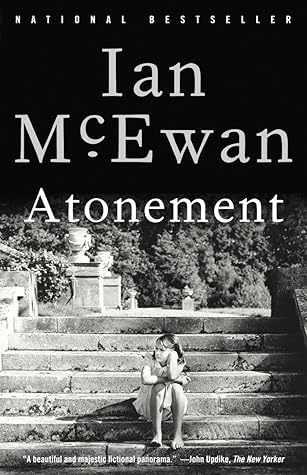the play told a tale of the heart whose message, conveyed in a rhyming prologue, was that love which did not build a foundation on good sense was doomed.
One of the literary ghosts that stalks this novel is Jane Austen. Her heroines typically cross a moral minefield to find and marry the right man. Along the way there are important life-lessons to be learned, principally how to read other people. Impulsiveness, vanity, deceit and rudeness must be surmounted. The suitable man is kind, honest, trustworthy and financially secure. However, he will have lessons to learn too.
These good-sense qualities are not always evident at first. In an Austen novel, sexuality is not directly addressed, of course, but is richly implied by a certain powerful fascination, an awkwardness in conversation, a blush, self-consciousness or an outburst of anger. The epigraph at the beginning of Atonement is from Northanger Abbey. The passage is worth re-reading, not only for the delightful lucidity of Austen's prose, but because it ties the story of the heroine, Catherine Morland to Briony's. Catherine has been immersed in her reading of lurid gothic novels and her imagination runs riot. She is staying in a former abbey and suspects her host of murder. Henry Tilney, her future husband, brings her back to earth in the passage I quote.
Briony's 'spontaneous Arabella' must also face moral hazards before she marries her prince. Appropriately from a pre-pubescent author, this 'tale of the heart' is sexless. Like Catherine, Briony herself lets her imagination go wild and causes suffering to others. As a novelist, she will spend a lifetime writing many shifting accounts of her misdeeds in the attempt to atone. Ultimately, her fiction writer's instincts prevail and she falsifies the past to give satisfaction to her readers, and as 'a final act of kindness', and to make 'a stand against oblivion and despair'. But in her postscript she reveals the truth and accepts the inherent difficulty of atonement. Perhaps all that counts is the effort to atone - 'The attempt was all.'
In too brief a summary, this is Briony's life-lesson. I return to the question of what can be learned over a lifetime in my new novel - actually called Lessons. Do we get wiser as we age? There are powerful elderly politicians around today who hardly seem wise. But surely something is learned after many decades on earth. Lessons tells the story of the life of Roland Baines. An intense sexual experience in his early teens deflects his existence. He passes through love affairs, fatherhood, two marriages, social and technological change. The course of his life and his changing state of mind are shaped by global political events that lie far beyond his control. He is haunted by what he might have been, and by admiration for what his first wife has achieved - at the cost of her own and other people's happiness. What has he learned? Absolutely nothing, he thinks as he approaches his mid-seventies. But can we believe him?
chiara and 728 other people liked this
See all 26 comments
· Flag
Andrew Robertson · Flag
Elle · Flag
B

